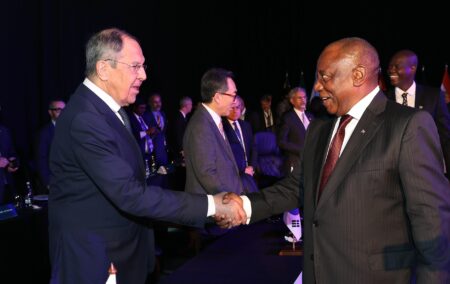As with governance in South Africa, the country’s foreign policy also suffers from incompetence, it seems. This can be one’s only conclusion, following the G20 meetings of Foreign Ministers and Finance Ministers in South Africa.
The run-up to the G20 meetings was overshadowed by the boycott of the G20 by US President Donald Trump and his Secretary of State and Treasury Secretary, given the frosty ties between the two countries. Eventually the US did participate in the form of its Chargé d’Affaires in Pretoria.
This low-level participation and the boycott by US Secretary of State Marco Rubio from the Johannesburg gathering must be viewed as a major diplomatic rebuke to the Ramaphosa Administration. Further, complicating Pretoria’s task was the cold shoulder given to Russian Foreign Minister Sergey Lavrov from Western G20 ministers, who did not even want to have a group photo with him. This resulted in the photo op being cancelled. Following the Trump-Zelensky meeting in the Oval Office, and the growing divide between European countries and Washington on Ukraine, Pretoria is doubly burdened to achieve consensus amongst G20 members. These, of course, Pretoria could not control. However, the major reason for the shambles of the G20 Foreign Ministers’ meeting in Johannesburg and the G20 Finance Ministers’ meeting in Cape Town must firmly lie with the Union Buildings and the Department of International Relations and Cooperation (DIRCO). We can only conclude that South Africa’s presidency of the G20 is therefore off to a rocky start.
In his opening address to the G20, President Ramaphosa stressed the importance of multilateralism and the rule of law in addressing the problems the world is confronting.
Chiding
There is nothing wrong with this, but to the Americans it felt as if South Africa was chiding the Trump Administration. It does not help when others accuse Pretoria of hypocrisy, for instance, on the rule of law: protecting Sudan’s Omar al Bashir from an ICC warrant for the deaths of 300,000 fellow Africans in Darfur, or siding with Janjaweed leader turned warlord and General, Hemedti, who is also accused of genocide in Sudan’s current civil war.
Whilst UK Foreign Secretary David Lammy and India’s External Affairs Minister Subrahmanyam Jaishankar did attempt to put Africa’s myriad conflicts on the agenda at the G20, perhaps this was too soon for the host nation, given South Africa’s painful and entirely self-inflicted disastrous intervention in the Democratic Republic of the Congo.
One of the reasons for the failure to reach consensus, in my view, is Pretoria’s inability to understand that phrases like Global North and Global South have less resonance. India and China are global players and these two countries were the pre-eminent economic giants 200 years ago.
Less willing
Future historians will no doubt argue that Western hegemony had a short interregnum before power shifted rapidly to the East. Conversely, economic challenges in Western countries make them less willing to provide developmental assistance elsewhere, when their own populations are not doing so well.
In this context, South Africa’s insistence on more developmental finance for the Global South and Africa in particular was bound to be a non-starter. If Pretoria had carefully analysed what happened in the November 2024 American elections as well as the rise of the AFD in Germany, it would know that these Western populations are increasingly demanding that their states provide for their own citizens first. With a more sophisticated foreign policy, taking its cue from the fact that SA is the most unequal country in the world with rich and poor co-existing side by side, we could have been a perfect communicator between the developed and developing worlds. However, we squandered our chance.
Another reason for failure, in my view, was the wish-list or shopping basket approach which the South Africans brought to the table. Foreign Minister Lamola stated that the priorities for South Africa from the G20 Summit included disaster resilience, ensuring debt sustainability for low-income countries, mobilising finance for a just energy transition and harnessing critical minerals for inclusive growth and development. One cannot have so many priorities. Moreover these priorities did not necessarily speak to each other, nor was the ground prepared for this before the Summit. In addition, these priorities did not come with a price tag or an implementable strategy. And it did not speak to the changed circumstances we find ourselves in.
Rather vague
Following the ending of the G20 Foreign Ministers’ meeting, South Africa’s Ronald Lamola had little concrete to say on what was finally agreed upon by all – except that all parties emphasised the need to reform the institutions of global governance. But this rather vague statement tells us nothing – there are no details, no specifics and no timelines, which suggests that not much consensus was found at the meeting.
The meeting of G20 Finance Ministers was also a disaster, since a number of these ministers did not show up at the meeting in Cape Town. These included the finance ministers of the US, China, Japan, India, Canada and the EU.
The meeting was marred by disputes over issues of climate, debt and inequality. Consequently, no communiqué emanated from this meeting. Once again, it begs the question of how much planning was done before this meeting with a view to arriving at some form of consensus, no matter how diluted.
This is the first time that an African country has played host to the G20 and South Africa has botched it, not only for itself but for the entire continent. No doubt, other African countries like Nigeria will seek to unseat South Africa as Africa’s representative.
[Image: https://www.flickr.com/photos/governmentza/54341010096/]
The views of the writer are not necessarily the views of the Daily Friend or the IRR.
If you like what you have just read, support the Daily Friend

